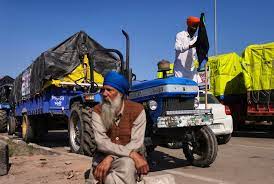
In a widespread display of dissent, farmers across Punjab, Haryana, and western Uttar Pradesh took to the streets in tractor rallies, burning effigies representing the World Trade Organization (WTO) as they demanded the withdrawal of the agriculture sector from the WTO agreement. Led by the Samyukta Kisan Morcha (SKM), protesters parked their tractors along highways, causing disruptions and highlighting their grievances against global trade policies.
The call for protests by SKM, an umbrella body of various farm unions instrumental in the 2020-21 farmers’ agitation, resonated across the region, with demonstrators converging along key thoroughfares to voice their opposition to the WTO’s influence on agricultural practices. Effigies symbolizing the WTO were set ablaze at multiple points, including Khanauri and Shambhu on the Punjab-Haryana border, where farmers have been encamped following a halted march to Delhi.
Farmers expressed concerns that WTO policies aimed to curtail farm subsidies, posing a threat to their livelihoods. The demonstrations in western Uttar Pradesh, prompted by the Bharatiya Kisan Union (BKU), disrupted vehicular traffic and underscored the widespread discontent among agrarian communities.
BKU spokesperson Rakesh Tikait criticized the government’s alleged neglect of farmers’ demands, condemning the hardships faced by those protesting on the Punjab-Haryana border. In Uttar Pradesh’s Muzaffarnagar district, tractor marches and road blockades added to the vehicular chaos, with farmers asserting their demands for legal guarantees of minimum support prices (MSP) and debt waivers.
Similar scenes unfolded in Punjab’s Hoshiarpur, Amritsar, and Ludhiana, where farmers rallied along highways, denouncing WTO policies as detrimental to their interests. In Haryana’s Hisar, demonstrations spanned 50 locations along state and national highways, with the All India Kisan Sabha (AIKS) highlighting the adverse impact of WTO regulations on MSP for crops.
The protests underscore the deep-seated grievances among farmers regarding trade policies that they perceive as undermining their economic security. As tensions escalate, farmers remain resolute in their demand for greater government support and protection against perceived threats posed by international trade agreements.
Sources By Agencies




